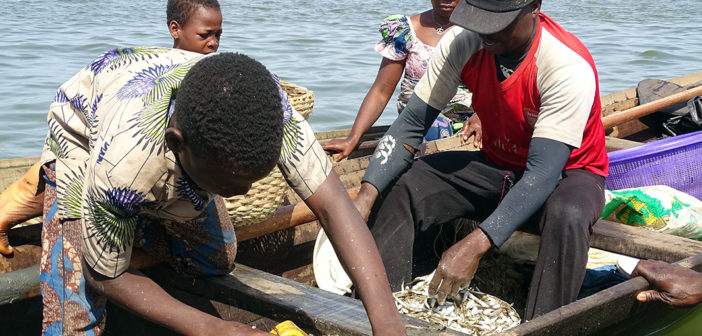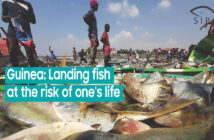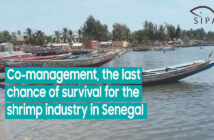Small scale fishery is the mainstay of millions of Nigerians, especially for people living in the coastal areas in southern Nigeria. The industry has, however, grappled with inadequate financing which, with the right intervention of insurance companies and microfinance banks, significant sustainable production can be revived in the sector.
By Yusuf Akinlotan and Isa Elegbede
According to the Nigerian Fisheries Statistics Report, the country’s annual fish demand is estimated at 3.32 million metric tonnes. Domestic production accounts for 1.12 million metric tonnes while 2.22 million metric tonnes are supplied mainly through importation. This leaves Nigeria as the fourth largest importer of fish in the world.
Over 20% of Lagos’ geographical area is covered with water, and that provides the state with viable platforms for seafood production, particularly in the aspect of small-scale fishery. Epe, Badagry, Ikorodu, Makoko and some other coastal areas of the state are identified as hubs of vibrant local fish production.
According to Abisola Olusanya, the special adviser to the State Governor Babajide Sanwo-Olu, on Agriculture, Lagos requires over 372,000 metric tonnes of fish in demand for consumption.
Still, it can only produce 155,000 metric tonnes combining both the artisanal fisheries and fish farming in the state. This situation indicates that the chain of demand is higher than the supply, thus suggesting the wide gap or the missing links between the domestic fishers and adequate supply and demand.
However, what could be the factors limiting the sustainable production which have affected the growth of the sector in Nigeria? Here are the findings from interactions with domestic fishers in Badagry, Epe, Ikorodu as well as other stakeholders in the field.
The Fish Supply
Small scale fishers’ operations have different sides to their various stories. Aside from environmental factors, one of the problems currently confronting them is survival.
The conflict between small scale fishers and the industrial fishing operators that come within the 5NM fishing zones recognized by law for artisanal fishing activities are among the external forces affecting the fisheries.
Segun Zebulon, a fisherman in Bariga lagoon side of Lagos, says big ships often destroy their fishing nets on the sea without any form of compensation.
For Dr Emmanuel Babatunde, from the Department of Marine Sciences, University of Lagos, Akoka, who specializes in Fishing Gear and Fish, the issue is that there are small scale fisheries and the commercial fishery or industrial fisheries.
He said: “The small-scale fisheries, use majorly low-tech small inputs for the fishing. It was revealed from our studies done so far in some areas in Lagos and some coastal parts of Ondo State. We came to realize that some of these people don’t have enough to continue resources to carry on their operations.”
Research also revealed that the saving habits of these fishermen are poor due to the low income generated from the production. However, the impact of climate change could also be a key factor affecting their course.
This is also the view of Dr. Jerome Fisayo, a Chief Research Officer in the Department of Fishery Resources and Marine Biology Section, Nigeria Institute for Oceanography and Marine Research (NIOMR), Victoria Island, Lagos, Nigeria.
She says that the season affects fishes and most of the fish species are seasonally based. Most times during the rainy season except there is more fish for them, the waves affect their fishing activities.
On the institute’s effort towards supporting fishers, Dr. Fisayo said, ‘’Over time, we have opportunities of doing focused group discussion, sensitization, and awareness on some endangered species to them. Besides, we move away from our aim by asking them about their demography and their financial status.’’
Fish farmer, Sejiro Michael Oke-Tojinu lives in the Badagry area of Lagos state and doubles as the Vice President for fish farmers in the state. He believes access to funds will go a long way in changing their narrative in this sector.
“We don’t have access to funds as we should have, so most times your proceeds, it’s your proceeds you get from sales that you put back or you plough back into the business, most often. That’s one challenge we have with fish producers generally,” he pointed out.
Taiwo Olakunle, a graduate of the University of Lagos and Fish Scientist with many years of practice, said that it depends on the individual as most fish farmers take the job as a hobby. But for him, fishery is his means of sustenance.
“Well for someone like me that is the only means of livelihood I have. I don’t do anything else, everything I do is connected to Fish; consultation, construction, everything I do is connected to it. But other people do it as probably as a hobby but most people who practice as full-time farmers don’t have other sources,” he said.
Undoubtedly, fishery, like other jobs, is prone to setbacks. These can come in the form of associated risks such as tool damage, canoes, disasters, theft, attacks on the fishers, inadequate catches amongst others.
With the identified challenges confronting small-scale fishery in Nigeria, there arises the need for intervention of corporate organizations in the insurance and microfinance.
With Fishermen’s low income and inadequate savings, Dr. Aderonke Lawal-Are, Chairman of the Fishery Society of Nigeria (FISON), Lagos branch, implores them to form a functional cooperative as it will enable them to gain access to available loans.
Insurance, microfinance intervention
There are hundreds of registered Insurance companies and even more microfinance banks licensed by the Central Bank of Nigeria, CBN.
They are supposed to serve as viable platforms for the rejuvenation of small-scale fishery if the domestic fish farmers key in and are on the same page with the two financial institutions.
But some of the fishers said that most of them could not cope with the terms and conditions attached.
Mr. Ahizu Ashade, the chairman of fishermen in Badagry, while relating his experience, acknowledged the idea of financial institutions like microfinance but claimed members of the association struggled to meet up with banks terms and conditions. “We fishermen would prefer to do (a kind of) micro activities in our way among ourselves because when we go to these banks, we will be told to come and keep the money for three months and there is no assurance that we will meet up with our target from the sales,” he said. These conditions have, indeed, contributed to the reasons the fishermen lose interest in insurance or microfinancing.
Speaking on this issue, a Professor of Fishery and Head of Department at the Lagos State University, Ojo Lagos, Sheu Akintola, said the fishermen are usually described as the poor of the poor. At the same time, they also lack adequate information about insurance and microfinance programmes.
“It has always been a situation of a lack of information and lack of a suitable programme aimed at ensuring that this critical sector of our economy is captured,’’ he said.
According to the Chief Commercial Officer of Al Barakah Microfinance, Agboola Rasak, it is preferably that fishermen come in groups or as associations instead of individuals.
“We will appreciate it if the fishers can come in clusters. For instance, we have a fish farm settlement in Ikorodu, one of the largest in Lagos state. Still, preferably they do it in the group so that they share ideas, knowledge, and their various risk experiences,’’ he noted.
On the risk hazard of the domestic fish farmers, Niyi Abiola, Corporate Service Representatives of Leadway Assurance, confirmed in an interview that its Agric department responds to small scale fishery which is a sub-segment of their Agriculture Insurance programme.
Proactive support from microfinance banks, insurance companies as well as government’s non-interest lending support and massive private investment, will help the fishing industry achieve sustainable seafood output. This development would solve some of the significant challenges in the fishery sector, mainly artisanal fishery.
The project was supported by REJOPRA, Network of Journalists for Responsible and Sustainable Fisheries in Africa.





